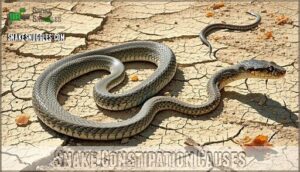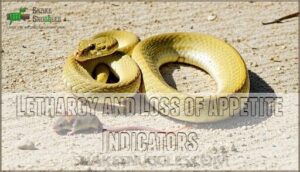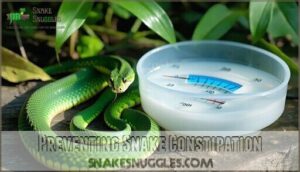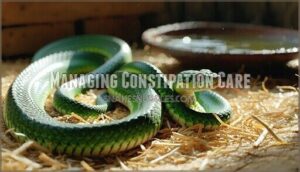This site is supported by our readers. We may earn a commission, at no cost to you, if you purchase through links.
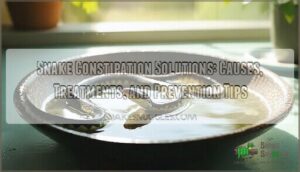
Start with a warm soak—around 20 to 30 minutes in shallow, lukewarm water can often get things moving. Gently massaging its belly, working downward from the rib area, might also encourage bowel movements.
Check the enclosure’s temperature and humidity too; low levels can slow digestion, so make sure they’re within your snake’s needs. Avoid overfeeding, as this can lead to blockages.
If nothing’s working or your snake seems uncomfortable, consult a reptile vet. A little care now can prevent bigger issues later!
Table Of Contents
- Key Takeaways
- Snake Constipation Causes
- Recognizing Constipation Signs
- Constipation Treatment Options
- Preventing Snake Constipation
- Managing Constipation Care
- Frequently Asked Questions (FAQs)
- How to help a snake with constipation?
- How do you treat a constipated reptile?
- How long can snakes go without pooping?
- Can I feed my snake again if he hasn’t pooped?
- How do you stop a snake from getting constipated?
- What can I do to relieve constipation?
- Why do snakes get constipated?
- How do you get rid of a snake poop?
- What are the signs of constipation in a snake?
- Why do snakes experience blocked bowels?
- Conclusion
Key Takeaways
- Keep your snake hydrated with fresh water daily, mist the enclosure, and ensure proper humidity levels to aid digestion and prevent constipation.
- Maintain the right temperature gradient in the enclosure, with warm basking spots and cooler areas, to support healthy digestion and bowel movements.
- Avoid using unsafe substrates like sand, overfeeding, or oversized meals that can lead to blockages or impaction.
- Monitor your snake for signs of constipation, like lethargy or bloating, and try warm soaks, gentle belly massages, or consult a reptile vet if needed.
Snake Constipation Causes
Snake constipation often happens due to issues like dehydration, low temperatures, or improper diets, all of which disrupt normal digestion.
Dehydration, low temps, and poor diets disrupt digestion, making constipation a common challenge for snakes—keep their care seamless and stress-free.
Ingesting unsuitable bedding or dealing with parasites can also create blockages, making it harder for your snake to stay healthy, which is a result of improper diets and other factors like dehydration.
Dehydration and Water Intake
Dehydration often causes snake constipation, so staying hydrated is key. Make certain water availability and encourage drinking behavior to support digestion.
Staying hydrated is crucial for snakes, as proper water intake supports digestion and helps prevent constipation and health issues.
Follow these tips to ensure your snake’s digestive health:
- Provide a shallow water dish daily for drinking and soaking benefits.
- Mist the enclosure to support hydration methods.
- Replace water often to prevent dirt buildup.
- Monitor your snake for signs of dehydration like sunken eyes.
Proper hydration requires a suitable water container to support the snake’s overall health and prevent issues like dehydration and constipation.
Low Temperature and Humidity Effects
A low temperature gradient and poor humidity levels can slow digestion, putting your snake at risk of constipation.
Cold enclosures hinder bowel movement, while dry air leads to shedding issues and dehydration.
Proper reptile husbandry, like misting the enclosure and maintaining balanced environmental temperature, supports healthy digestion and helps prevent issues such as shedding.
Verify these conditions to prevent snake constipation and keep their system functioning smoothly.
Substrate Impaction Risks
Impaction severity often depends on substrate types in your snake’s enclosure. Materials like sand, Sani-Chips, and cypress mulch can lead to snake impaction if ingested.
Avoid these by following preventative measures: One key factor is ectothermic temperature regulation, which influences digestion.
- Use safe substrates like paper towels or reptile carpet.
- Feed your snake outside its enclosure to minimize ingestion.
- Monitor your snake’s behavior for signs of discomfort.
Overfeeding and Obesity Issues
Overfeeding snakes isn’t just a rookie mistake—it’s a recipe for trouble.
Feeding frequency and prey size matter. Oversized meals and inconsistent schedules can lead to obesity, which reduces mobility and disrupts digestion.
Portion control and weight management are key snake feeding habits. Add exercise needs to the mix, and you’ve got snake constipation solutions that prevent unnecessary health risks.
Parasitic Infections and Infestations
Parasite infections, like coccidia or flagellate protozoans, can trigger snake constipation.
These sneaky culprits disrupt digestion, leading to blockages.
Regular parasite diagnosis guarantees early detection.
Treatments like metronidazole target infections effectively.
- Look for signs, such as weight loss or lethargy.
- Schedule a fecal examination for accurate insights.
- Partner with a vet for snake constipation treatment.
- Maintain clean enclosures to prevent reinfection.
Recognizing Constipation Signs
When your snake is constipated, you’ll notice clear signs if you know what to look for.
Changes like refusing food, acting sluggish, or appearing uncomfortable during handling can all point to trouble.
Lack of Bowel Movement Symptoms
If your snake won’t poop, watch for straining during defecation, lethargy, or irritability when handled.
Appetite loss is another common sign of snake digestive issues, alongside noticeable fecal changes like hard or infrequent stools.
These snake health issues often signal constipation symptoms. Regular monitoring can help you catch these snake health problems early and address them promptly for better outcomes, which can lead to improved snake health and overall well-being, by preventing severe cases of digestive issues that may cause lethargy.
Behavioral Abnormalities and Changes
If your snake’s behavior shifts, it might signal constipation.
Look for these signs:
- Hiding behavior—staying burrowed for long periods.
- Enclosure aggression—sudden irritability regarding handling.
- Reduced activity level—moving much less than normal.
- Regurgitation frequency—vomiting more often than usual.
Stress-related anorexia may also appear.
Monitor their environment closely, as inadequate stimulation or poor enclosure setups might be contributing factors.
Lethargy and Loss of Appetite Indicators
If your snake shows decreased activity, won’t eat for days, or has noticeable weight changes, it might be constipated.
Muscle weakness or regurgitation signs can also hint at issues.
Monitor anorexia duration closely—it’s a major red flag.
| Sign | What to Look For | Action to Take |
|---|---|---|
| Decreased Activity | Lethargy, minimal movement | Check their environment |
| Loss of Appetite | Skipped meals | Adjust feeding or consult a vet |
| Weight Changes | Sudden loss or gain | Evaluate diet and hydration |
| Regurgitation | Vomit-like behavior | Seek immediate vet care |
Irritability During Handling Signs
When your snake becomes irritable during handling, it could be more than bad temper—it might signal constipation.
Watch for handling stress, defensive behaviors, or muscular tension.
Biting risk and escape attempts often show discomfort caused by snake health concerns like blocked bowel movements.
Understanding snake behavior guarantees better snake care and helps you recognize health issues, including constipation-related discomfort.
Physical Changes in The Abdomen
You might notice physical signs of snake constipation by gently feeling the abdomen.
Watch for:
- Abdominal palpation revealing hard lumps from fecal impaction.
- Coelomic distension, where the belly appears bloated.
- Small, firm urate plugs blocking the cloaca.
- Severe cases may show cloacal prolapse, where tissue protrudes.
These symptoms signal snake constipation causes needing attention to safeguard their health.
Constipation Treatment Options
When your snake shows signs of constipation, there are a few effective ways to help it get relief.
From warm soaks to vet care, these methods focus on safely addressing the problem while ensuring your pet stays healthy.
Warm Water Baths and Soaks
You’ll give your snake a warm water bath to help with constipation, ensuring the water temperature is comfortable, and the soak duration is suitable.
Then provide post-soak care, as this can help your reptile, especially if your snake won’t poop, using reptile constipation solutions effectively.
Specialized products can help, such as a reptile soak solution, to support the health of your reptile.
Gentle Belly Massage Techniques
After a soothing warm bath, a gentle tummy massage can work wonders as part of snake constipation solutions.
Use soft fingertips to stroke from front to back, focusing on pressure points to encourage GI motility.
Oils like coconut add ease.
Stick to weekly frequency guidelines.
Improved hydration impact pairs perfectly with post-massage care, helping your snake feel comfortable again.
Environmental Adjustments and Changes
Maintaining your snake’s environment makes a big difference for constipation relief.
Try these adjustments:
- Temperature gradients: Keep basking spots warm and cool areas cooler. Balanced temperatures aid digestion.
- Humidity control: Add moisture with misting or water dishes to prevent dryness.
- Substrate selection: Avoid sand or sharp bedding, as these can cause impaction.
If these adjustments prove ineffective, consider veterinary constipation treatments. Proper care means a healthier, happier snake!
Veterinary Consultation and Care
Sometimes, environmental tweaks aren’t enough, and a reptile vet becomes your best resource.
A veterinarian can use diagnostic imaging to detect blockages, recommending fluid therapy or surgical intervention if needed.
Antibiotic use may address infections, while chronic management focuses on diet and environment improvements.
Regular snake vet visits guarantee effective snake treatment and long-term health.
Preventing Snake Constipation
Preventing snake constipation starts with maintaining proper conditions in their environment, including a suitable temperature gradient, fresh water, and appropriate substrate.
You’ll also want to avoid overfeeding, keep an eye on their habits, and schedule regular checkups with a veterinarian to catch any issues early, which is a key part of maintaining their health and preventing constipation.
Providing a Temperature Gradient
A proper temperature gradient helps prevent reptile digestive issues by supporting natural processes.
Verify the basking spot temp suits your snake’s species temperature needs, while the cool side temp offers a safe refuge.
Use thermostat control to maintain balance, as this is vital for your snake’s health.
Without this, your snake won’t poop easily, risking impaction, so it is crucial to get this right to prevent serious issues, and gradients are vital, so consult a reptile vet for guidance if unsure about maintaining the right temperature gradient.
Offering Fresh Water and Proper Substrate
Fresh water is essential for snake hydration and overall health, helping with shedding aid, digestion, and snake constipation prevention.
Choose a clean, non-aromatic substrate like aspen shavings or newspaper to maintain enclosure hygiene and proper humidity levels.
The right substrate selection improves the snake environment, supporting comfort and moisture. A proper setup includes a suitable water dish for hydration.
Never underestimate water availability—it’s vital for a balanced snake care routine!
Avoiding Overfeeding and Obesity
Overfeeding snakes can lead to obesity and serious constipation issues.
Stick to proper portion control by matching prey size to your snake’s width and maintaining a consistent feeding schedule.
Exercise matters too—encourage movement to support digestion.
Regular weight monitoring helps gauge snake nutrition and spot issues early.
Snake diet adjustments prevent health problems, keeping your snake lean and happy.
Ensuring proper enclosure size can also help prevent obesity and support overall health, through a well-planned feeding schedule.
Regular Observation and Veterinary Care
Keeping an eye on your snake’s habits is a game-changer for Early Detection of issues like constipation.
Regular preventative checkups with a veterinarian guarantee Long-Term Health and provide Professional Expertise when needed.
Snake health monitoring at home, combined with occasional Fecal Exams, strengthens overall care, and proactive reptile veterinary care gives you peace of mind while keeping snake constipation solutions manageable, ensuring Professional Expertise.
Managing Constipation Care
When your snake is dealing with constipation, you’ll need to focus on consistent care and close observation.
By monitoring their behavior, adjusting their environment, and consulting a vet when needed, you can help them recover and prevent future issues related to constipation.
Monitoring and Recording Behavior Patterns
Tracking your snake’s habits is key to spotting issues early.
Use activity logging to track bowel movements, appetite changes, and shedding patterns.
Note social interactions and enclosure use to identify stress or inactivity.
These snake care tips aid in snake health monitoring, offering insights into snake digestive health.
Consistent records help snake wellness and provide actionable data for any snake constipation solutions.
Adjusting Environment and Diet Plans
To ease constipation, create a proper temperature gradient in the snake enclosure and provide fresh water using effective snake hydration techniques.
Adjust feeding schedules and include dietary fiber in the snake diet to support digestion.
Verify the enclosure size allows enough movement, and manage stress with simple environmental tweaks.
Balance is key in snake diet management to maintain gut health and support overall well-being with proper care.
Seeking Veterinary Care When Necessary
Sometimes, it’s clear your snake needs professional help. Seek snake veterinary care if constipation persists or worsens despite home remedies.
Veterinarians use diagnostic procedures like X-rays or ultrasounds to identify blockages or underlying issues. Treatment options, including fluid injections or enemas, may follow.
In severe cases, surgical options are available. Post-treatment care guarantees recovery and prevents recurrence, making reptile treatment essential for health.
Follow-up Care and Preventative Measures
Follow-up care matters for snake constipation prevention.
Stick to a long-term diet with fiber-rich prey, maintain hydration protocols like frequent water changes, and guarantee an exercise regimen to support snake gut health.
Schedule regular checkups to catch issues early. Stress reduction, like avoiding abrupt habitat changes, helps too.
Addressing low enclosure humidity can also aid in preventing constipation.
These snake care best practices strengthen overall health, simplifying constipation management and prevention.
Frequently Asked Questions (FAQs)
How to help a snake with constipation?
Start by soaking your snake in warm water for 30 minutes, gently massaging its belly toward the vent.
Make certain proper enclosure temperatures are maintained, increase humidity, and consult a vet if there’s no improvement or signs worsen, which may indicate a need for consult a professional.
How do you treat a constipated reptile?
Hydrate your reptile with warm water soaks, massage its abdomen gently, and adjust its diet to include high-fiber foods.
Create a warm, humid environment, and consult a vet if impaction or dehydration persists.
How long can snakes go without pooping?
Snakes can go several weeks without pooping, depending on their diet, age, and species.
Large meals, slow metabolisms, or cool temperatures delay digestion, but if it’s beyond a month, you should check for potential issues.
Can I feed my snake again if he hasn’t pooped?
Did you know snakes can go weeks without pooping?
If yours hasn’t yet, avoid feeding until it clears its system.
Overfeeding can worsen constipation, so focus on hydration and check temperatures for proper digestion.
How do you stop a snake from getting constipated?
To keep your snake from getting constipated, provide a proper diet with enough hydration and roughage.
Maintain ideal enclosure temperatures, make certain adequate exercise space, and avoid feeding substrates that can block their digestive system, which is crucial for preventing constipation.
What can I do to relieve constipation?
Warm water soaks can soften stools and help your snake pass them.
Gently massage its sides toward the tail.
Make certain proper hydration and basking temperatures, and consult a vet if symptoms persist or worsen.
Why do snakes get constipated?
It’s like nature’s way of reminding you snakes need excellent care.
They get constipated from dehydration, low temperatures, poor diets, or ingesting bedding, leading to backed-up guts.
Unbalanced husbandry is often the sneaky culprit.
How do you get rid of a snake poop?
To get rid of snake poop, gently clean it using a paper towel or disposable gloves.
Disinfect the area with a reptile-safe cleaner to remove bacteria.
Keep their enclosure clean to prevent health issues.
What are the signs of constipation in a snake?
When your snake seems sluggish, refuses to eat, or struggles to pass stool, it might be constipated.
Look for bloating, hard lumps near its tail, and unusual behavior like straining or increased restlessness.
Why do snakes experience blocked bowels?
Snakes often experience blocked bowels due to dehydration, low temperatures, or poor diets lacking fiber.
Stress, ingesting inappropriate substrates like sand, and underlying health issues, including organ problems or infections, can also substantially contribute to constipation.
Conclusion
Let’s face it—snake constipation isn’t the most glamorous topic, but it’s a vital part of being a responsible reptile owner.
With proper care, the right temperature, good hydration, and attention to diet, you can minimize the chances of digestive issues.
Be proactive by observing your snake’s behavior, and don’t hesitate to try warm soaks or gentle massages for relief.
If all else fails, consult a reptile vet, as these simple snake constipation solutions can keep your pet healthy and happy.
- https://www.youtube.com/watch?v=UwFqtt3idBc
- https://www.reptileforums.co.uk/threads/snake-constipation.1018879/
- https://www.reddit.com/r/snakes/comments/jd8ix1/warm_bath_ineffective_other_solutions_for_a/
- https://www.vetlexicon.com/exotis/reptiles/gastrohepatology/articles/constipation/
- https://ultimateexotics.co.za/constipation-in-reptiles/

